- Home
- Tony Roberts
Casca 44: Balkan Mercenary Page 7
Casca 44: Balkan Mercenary Read online
Page 7
Three men were there. One was a Serb soldier, his gun aimed at the other two. He turned, shock all over his face. Immediately the two he had been covering got up and wrenched the gun out of his hands and smashed him to the wooden floor, one stamping on his head to ensure the luckless soldier wouldn’t get up.
“Well, lucky we happened by,” Lonjic said to Mendez who had the soldier’s gun in his hands. He glanced at Baja, the Nigerian’s eyes two gleaming points in his face. “Where did they pick you up?”
“A couple of clicks back,” Mendez grumbled, making his way forward. “That damned MiG directed these assholes to our position and we were surrounded.”
Baja dragged the unconscious Serb to the tailgate which was dropped, and the man was bundled out into the undergrowth. Toloba and Baja then cleared the road of the other Serbs. Mendez nodded into the night. “Don’t know if the other three got away – there were other units chasing them. Hopefully they managed to keep clear.”
“So where were you being taken?”
“Don’t know,” the Argentinian shrugged. “My Serbo-Croat is shit and Baja speaks even less than that. I think there’s a camp up ahead.”
“Makes sense – we’re not that far from the frontier and I doubt they’d be taking you back to freedom. We’ll turn this thing round and drive to Bosnia. That was the plan anyway. Get their uniforms off and put them on.”
“Huh, Baja, you and Toloba won’t fit – and Baja isn’t a Serb!”
“Baja will stay in the back. I speak fluent Serbo-Croat so I’m in the front with you. You drive.”
Mendez swore and wandered off, muttering. Caps were found to fit but as Mendez predicted, the three big guys had to make do with their existing uniforms. Lonjic knew it wouldn’t pass in daylight, so the best thing was to get the hell out of there and make it to the frontier as soon as possible.
The truck was swung round and they left a pile of unconscious men in the undergrowth. Mendez drove back, lights on full beam. “We came to a junction up ahead and we’ll turn right. That’s the road we came down after being captured.”
“Good enough,” Lonjic said. He glanced at the Argentinian. “So what’s your story? I know about you being in the Falklands.”
Mendez looked sharply at Lonjic. “Malvinas!”
“Alright, alright, Malvinas, for Chrissakes. Whatever. You lost a brother there.”
“Common knowledge. The English killed him.”
Lonjic looked out of the window. All he could see was darkness and the occasional tree or bush whip past. “Best call them British; they had plenty of Welsh, Scots and Irishmen in their army, and calling them English would be like calling you Chilean.”
Mendez pulled a face. “Very well, British. He died at Goose Green.”
Lonjic grunted. The defining battle for the Falklands – the outnumbered but better trained British forces had attacked an entrenched enemy at night and had swept them aside, despite heavy resistance. It had cost plenty of casualties, but had broken the back of the Argentinian defenses. “I’m sorry, Mendez. So where were you in this campaign?”
“Same place – I got out. Those devils were everywhere; our commanders had no idea how to deal with them. Everything collapsed so suddenly and then we were fleeing for Stanley. The rest you know; they swept over Tumbledown and that was it. We had boys against men! So I quit. The British took us prisoner and repatriated us fairly quickly.”
“You quit after you got back to Buenos Aires?”
Mendez shook his head. “I quit before the surrender. Made no difference though; I was rounded up and imprisoned like the rest. I left Argentina and made my way to Colombia. Plenty of fighting there. I hired myself out to the government forces fighting the Medellin cartels. That was a bastard of a job, I can tell you. Forget the newspaper shit; it was murder on murder – both sides. Anyway, I quit when I had a gut full of that and went to Spain.”
“Spain?”
“Yeah, fighting in the Spanish Sahara.”
“Oh yeah, that was a small little-known war.”
Mendez snorted. “But just as evil. Still, it got me contacts and from there I found more jobs. Mostly Africa of course. Angola, Somalia. You know the usual places.”
“Yeah, I know.” Lonjic spoke to Mendez a little more about the history of the merc, then they came to a junction, running left or right. Mendez looked at Lonjic.
“Oh, shit, any direction – in the dark I can’t tell and we don’t have a map. Left is deeper into Serbia, right is towards Croatia.”
Mendez shrugged and swung the wheel to the right. They carried on for a while, then the road widened. Lonjic motioned for the Argentinian to slow down. He opened the window and peered out, looking for any sign of life. The road looked new. On the roadside the recent works were quite evident in the headlights. Earth was piled up to either side, stones and rocks lay scattered about and the ripped up vegetation lay in forlorn piles off beyond the verges.
“Come on, we’re getting out,” Lonjic said softly to Mendez. “We leave the truck here.”
Mendez opened his mouth to object, then thought better of it, shrugged and leaped out, M70 in one hand. Lonjic stuck his head round the rear, telling Toloba and Baja to get out. The four walked off to the left hand side, pushing some of the piles of discarded wood and stone out of the way, negotiating huge lumps of dried and hardened earth that could have turned an ankle easily. The ground was uneven and they walked up an incline before the land fell away again. The terrain here was punctuated by brush and clumps of grass. Rough land, uncultivated, set close to the River Sava.
They made their way across the area, strung out in a loose line, Baja and Toloba on the flanks. It was close to midnight when they arrived at the village, an un-named place, set on the northern bank of the river. Lonjic clicked his fingers and brought the others to his side. He knelt, peering at the dark oblong of the first house or hut – it was hard to tell in the dark – and listened intently for a moment.
“These are civilians. I don’t want any shooting or killing unless it’s absolutely necessary. Our job is to get across the river before daylight. It may well mean us stealing a boat or two, but hell, we’re in Serbia and we need to be across in Bosnia which is over there. That mountain is just a short distance away and hopefully we’ll meet the others there. Now let’s sneak through to the river and see if there’s a boat or two to take.”
They made their way like wraiths into the village, avoiding a wooden fence that came out of the darkness, standing at knee-height. The perfect type to trip the unwary. A dog barked in the distance and Lonjic glanced to the right but could see nothing. The land sloped downhill and that was fine, as it meant they were heading in the right direction.
They could hear the chuckling of the water now, and the smell of the river reached them – rotting weeds and the like – and then they were round a corner and staring at the obstacle. Running from right to left, the river was a large tributary of the Danube and joined it at Belgrade. It separated two of the former constituent republics of the now moribund Yugoslav state, but Serbs lived on both sides of it.
Looking to either side, Lonjic caught sight of a boathouse and a jetty where the villagers clearly had fishing boats or ferries. Whatever, they needed to get over and there they would find what they needed.
They negotiated a fence that was rotting – Toloba found that out when he put a hand on the top rail and it crumbled away. Once past that they came to the house next to the jetty, and heard voices.
Sniffing the air, they detected cigarette smoke. Someone – or some people – were up and active at this time, which was not a good thing. Mendez took a look and ducked back hastily. He pointed round the corner and held up three fingers, then turned a thumb down. Lonjic cursed under his breath. Soldiers? Here? Taking no chances, clearly.
He crept to the end and looked round himself.
In the faint light of a poor quality lamp were three Serb militiamen. One was sitting on an upturned packing crate smoking a cigarette, cleaning a carburetor and joking with two colleagues who stood grinning at the tale he was telling. They held the semi-automatic M70 that was the trademark in this part of the world. The distance was twenty yards and across a flat, uncluttered killing ground.
No way could they start a firefight in this place. Beyond the three men a motor boat was up on a ramp, the engine cover raised. River police, clearly. Jerking his head to the others, they crept away. “Listen; those three are some kind of local policing force for the river. There must be a local HQ here somewhere. We’ll have to find it and take out their communications. Without them having a radio we got a chance of getting across before the alarm goes off. Spread out, go into the village and find it. Return here and report, then we’ll go after it.”
Lonjic watched as the three others slipped away into the night. The sounds of the river and the men talking were all he could hear, and apart from a few lights here and there, all was dark. The smell of oil was strong, however, and every so often he got a whiff of tobacco. The wind was light and blowing off the river, so he caught snatches of conversation, softly muted by the distance. The few words he picked out were inconsequential.
Toloba was the first back, shaking his head. He had gone back the way they had come so he had points of reference already, which was why he took the shortest time. Mendez was next, having gone into the village center, and he nodded. “The village mayor or whatever they have. His residence has radio masts. Guards by the doors. Militiamen.”
“Right – that’s out destination. We’ll go once Baja gets back.” Lonjic was getting worried about the time taken, but then suddenly the Nigerian was back, a big toothy smile across his face. “Nothing,” he whispered.
Lonjic filled him in and the four made their way towards the village mayor’s house. They turned a corner and Mendez nodded at a large brick and stone monstrosity dominating the square. The other buildings were much smaller and either partly of or wholly made of wood. Two men holding M70s were clearly identifiable. Lonjic nodded and boldly strode out into the road, casually walking towards the stepped entrance. The other three spread out in a thin line behind him.
There were street lights here and Lonjic hoped to hell Baja was not the focus of the two guard’s attention. One of the guards straightened. “Hey, who are you?”
“Militia, Novi Sad district,” Lonjic replied. “Reassigned from the Front to help find the Croat saboteurs.”
“We were not informed of that!” the guard swung the barrel of his M70 at Lonjic who was by now approaching the bottom of the five steps. The second guard straightened, too, warily.
“Well check with your commander; I’m not pleased at being sent on a wild goose chase, I can tell you, looking for a bunch of Croat Hajduks!” Lonjic clumped noisily onto the steps, his M70 slung over his shoulder.
“So what’s your rank? What’s your unit – where’s your insignia?” the guard demanded, his eyes narrowing suspiciously.
Lonjic grinned and suddenly smashed the barrel upwards, then sent a right blurring into the man’s ribs, forcing him over in one swift movement. The second guard swore and turned his barrel on Lonjic, but three clicks from the street halted him. He looked at the three men aiming at him and decided discretion was the better part of valor. He slowly lowered his gun and raised his hands.
Lonjic pulled the groaning first guard up by his lapels and thrust him into the front wall of the residence. “Right, Ivan, no noise. Lead us into the building.”
Under cover from the others, the two disarmed Serbs reluctantly walked into the house. It had a large entry lobby with four doors and a staircase. The doors were arranged two and two, to left and right. The staircase was directly ahead. Low light levels made it seem vaguely threatening.
“The radio room, now,” Lonjic hissed softly.
The guard sighed and stepped slowly to the right, then began to reach for the door. He whirled, a hand seeking out Lonjic’s face, but the Eternal Mercenary had been around far too long to fall for that. He grabbed the Serb’s arm, wrenched it up, then hammered a fist into his exposed gut and followed up with a second into his jaw that sent him over onto his back.
He struck the floor hard and lay there, out for the count.
The second came at Mendez but the Argentinian dropped, then thrust up, sending two punches into the Serb’s stomach as his fists missed the mercenary’s head. Mendez ended it by ramming his gun butt into the militiaman’s head, sending him crashing to the floor.
“Come on,” Lonjic hissed. “That noise will have woken someone!” He wrenched open the first door, the one the Serb had been going for. An unoccupied living room. The others quickly went to one of the other doors and all peered in and shook their heads.
“Damn it! Up.” Lonjic went up the stairs two at a time. As he got to the top a man came out sleepily from the first room, rubbing his eyes. One punch sent him toppling back to lie with his bare legs sticking into the corridor.
“Fucking Croat pig!” a man snarled from the end of the short passageway. A fully uniformed and armed Serb had appeared, dragging out a pistol.
There was no option. Lonjic blasted him into shreds, sending him jerking and shuddering against the wall, and the man slid to his ass, leaving a bloodied smear on the wooden planking. The sound of spent cartridges rattling on the bare floorboards sounded unnaturally loud in the aftermath.
“Go!” the scarred mercenary snapped to the others. “Check every room!”
Lonjic raced to the open doorway next to where the man he’d shot had come. Here was the radio. An operator stood, a pistol in his right hand and loosed off.
Lonjic almost got hit. He felt the breath of the bullet pass his left cheek as he jerked back in a reflex movement. Then he fired three times, cutting the operator down. The man fell backwards, tumbling over his chair, the pistol striking the floor loudly, the man slumping slowly in its wake.
Shouts were erupting from within the house, and now more shots were being fired. Lonjic looked at the metal faces of the radio equipment, the dials, switches and wires. One big box and three smaller ones, all with wires running from the backs, aerials pointing up from the tops; microphones, lights, God knows what else.
Making a snap decision, he pulled a grenade from his waist band and pulled the pin. Looking out of the doorway he saw Toloba shooting down the stairs and Mendez and Baja emerging from the other doors along the corridor with knives bloodied.
“Any other way out?” Lonjic asked.
“Nope, just this staircase,” Toloba replied, firing one more shot. “Couple of assholes down there hiding behind a doorway.”
“Mendez, Baja, give him covering fire, go down the stairs and clear the house. We’re getting out of here.” Lonjic yanked the pin and placed the grenade on the desk where the biggest piece of radio equipment rested, then rushed out of the room and pelted along the corridor. As he got to the stairs the room behind shook to the explosion.
The others were down the bottom, filling the air with gunfire. The smell of discharged rounds filled his senses as he joined them. Two Serbs lay riddled with shots in the room that was next to the foot of the staircase.
“Where did they come from?” he demanded. The rooms had been empty when they’d checked them before going up.
Toloba pointed to an open archway underneath the staircase. “From there.”
They detected fresh air wafting in so Lonjic urged them to go that way. They barreled along a narrow passageway and then burst out into the courtyard, lit by two harsh lights suspended from tall iron standards.
The surroundings were made up of a low wall topped by a ramshackle wooden fence, with a pair of badly-fitting gates in the far wall. A car was parked here, dark and silent. “Hey, we can take this!” Toloba declared excitedly.
“The keys – check those two dead men,” Lonjic snapped. Shouts were going up all round and it was beginning to look decidedly bad. They had to get across the border like yesterday. Mendez came running back, a couple of keys on a fob held up triumphantly. “Good! You drive,” Lonjic said, then turned to Baja. “Get those gates open now. I don’t care how.”
The Nigerian grinned and bounded over to the jauntily-leaning gates and shoulder-charged them. He took one off the hinges immediately, then turned on the other that was defying him and pulled it loose, throwing it with a flourish into the street beyond.
By this time Mendez had worked out the ignition of the car, which happened to be a Zastava 311, a locally produced saloon car with a box-shape, with only two doors. Toloba had piled into the back, looking squashed, and suitably alarmed, while Lonjic was in the front passenger seat. Mendez gunned the engine which rattled into life and flattened the accelerator pedal. The car hardly broke any land speed records as it gently arced around the yard towards the opening Baja had made.
The Nigerian looked at the speed the vehicle was doing with consternation. “You gonna try to outrun the Serbs in that?” he asked incredulously. “Shit man, I could run faster!”
“Then run alongside us, you wise-ass,” Mendez retorted through the opening in the door after he had wound the window down. “I’m not getting out to let you in, you overgrown lump.”
“Suits me fine, man,” Baja said. “I ain’t squashing myself in no coffin like that!”
Mendez muttered an obscenity and swung right into the street. Lights were on in nearly every house by now and their occupants were peering out at them, worried looks on their faces. The engine made a sound like a towel being rapidly flapped in the air as it strained to push the three men towards the river.
“If this is the boss’s car, what the hell have the ordinary people got?” Toloba asked querulously.
“They walk,” Lonjic said, grimly looking left and right.
“They got the better deal,” Mendez commented, wrestling the hard steering wheel. The turning circle of the car was probably akin to that of a cruise liner. He turned the first corner, the tires protesting, the engine revving far too much. When he tried to change gear, a dreadful grinding noise filled the saloon.
“Clutch, Mendez,” Lonjic said, staring ahead.

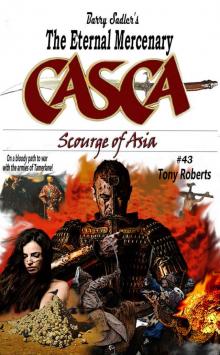 Casca 43: Scourge of Asia
Casca 43: Scourge of Asia The Lombard
The Lombard Casca 49: The Lombard
Casca 49: The Lombard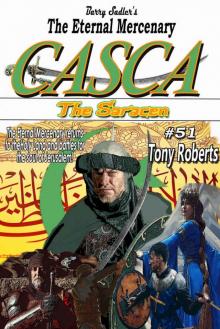 The Saracen
The Saracen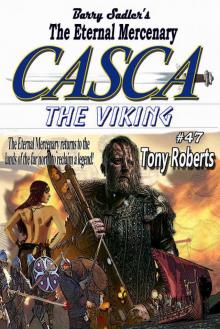 Casca 47: The Viking
Casca 47: The Viking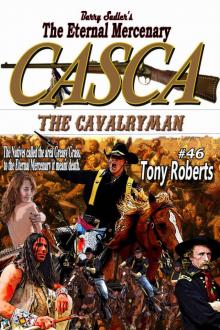 Casca 46: The Cavalryman
Casca 46: The Cavalryman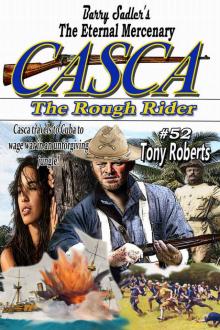 Casca 52- the Rough Rider
Casca 52- the Rough Rider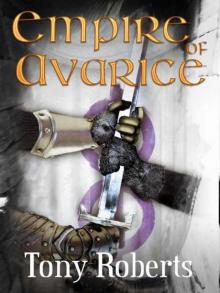 Empire of Avarice
Empire of Avarice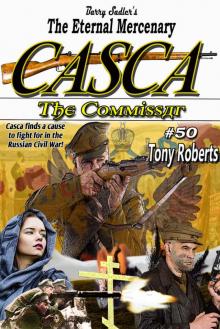 The Commissar
The Commissar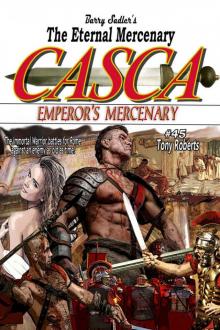 Casca 45: Emperor's Mercenary
Casca 45: Emperor's Mercenary Dark Blade
Dark Blade The Heir of Gorradan (Chronicles of Faerowyn Book 2)
The Heir of Gorradan (Chronicles of Faerowyn Book 2)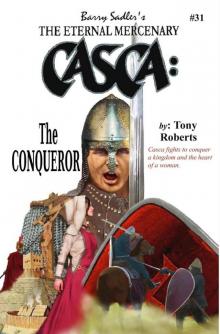 Casca 31: The Conqueror
Casca 31: The Conqueror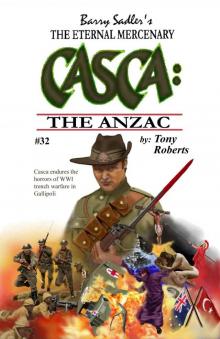 Casca 32: The Anzac
Casca 32: The Anzac The Anzac
The Anzac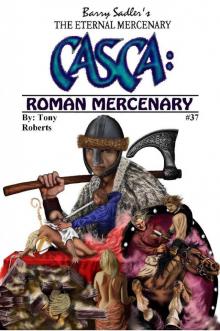 Casca 37: Roman Mercenary
Casca 37: Roman Mercenary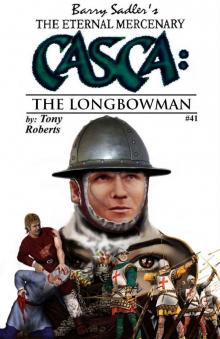 Casca 41: The Longbowman
Casca 41: The Longbowman The Longbowman
The Longbowman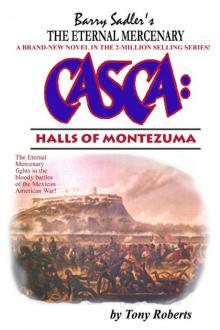 Casca 25: Halls of Montezuma
Casca 25: Halls of Montezuma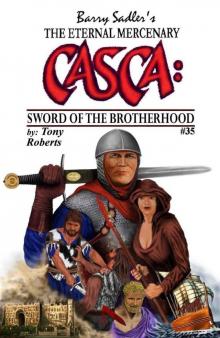 Sword of the Brotherhood
Sword of the Brotherhood House of Lust
House of Lust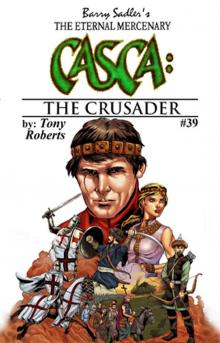 Casca 39 The Crusader
Casca 39 The Crusader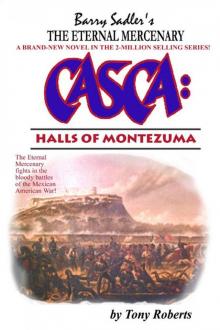 Halls of Montezuma
Halls of Montezuma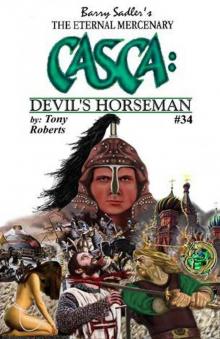 Devil's Horseman
Devil's Horseman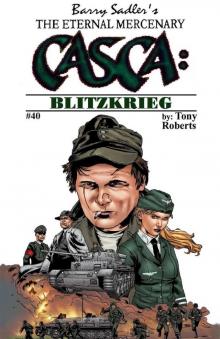 Casca 40: Blitzkrieg
Casca 40: Blitzkrieg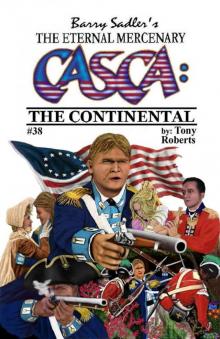 Casca 38: The Continental
Casca 38: The Continental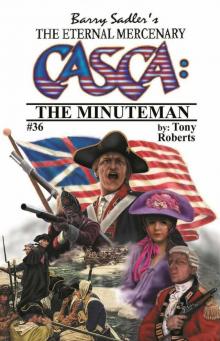 The Minuteman
The Minuteman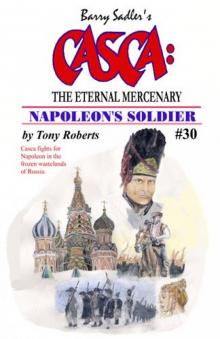 Napoleon's Soldier
Napoleon's Soldier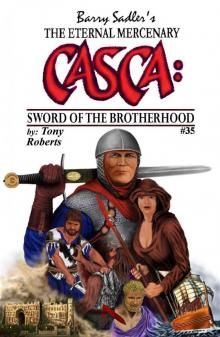 Casca 35: Sword of the Brotherhood
Casca 35: Sword of the Brotherhood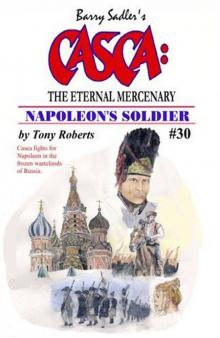 Casca 30: Napoleon's Soldier
Casca 30: Napoleon's Soldier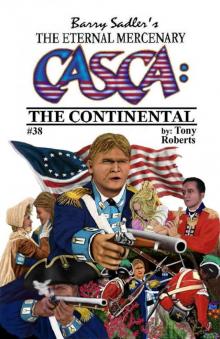 The Continental
The Continental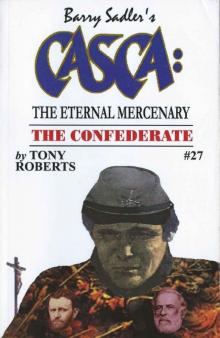 The Confederate
The Confederate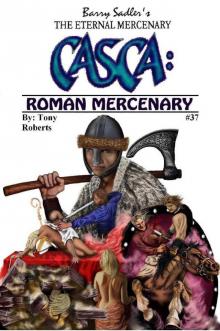 Roman Mercenary
Roman Mercenary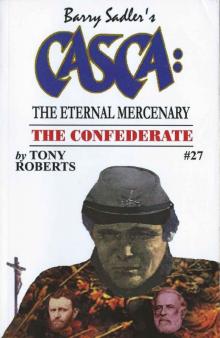 Casca 27: The Confederate
Casca 27: The Confederate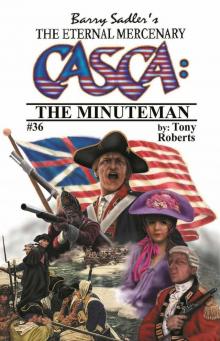 Casca 36: The Minuteman
Casca 36: The Minuteman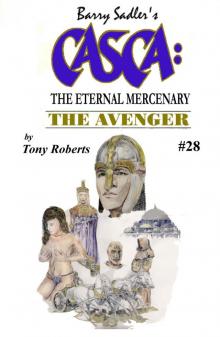 Casca 28: The Avenger
Casca 28: The Avenger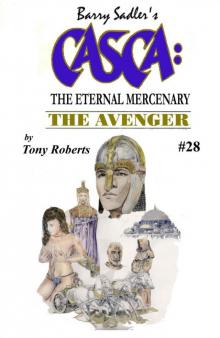 The Avenger
The Avenger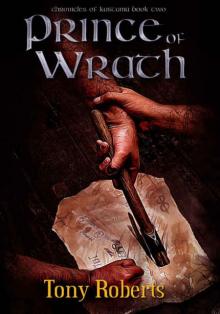 Prince of Wrath
Prince of Wrath